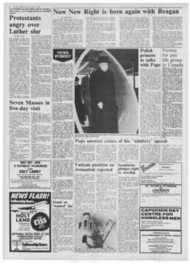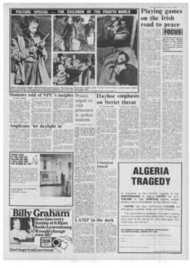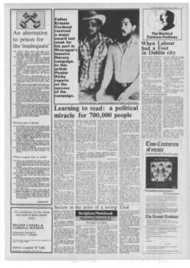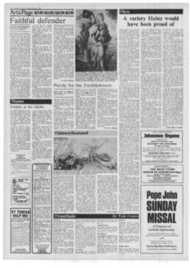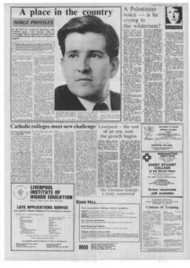Page 6, 31st October 1980
Page 6
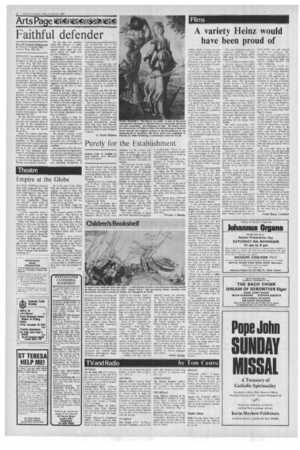
Report an error
Noticed an error on this page?If you've noticed an error in this article please click here to report it.
Tags
Share
Related articles
Theatre Gives Catholic View
Secret Papers Vindicate Pope Pius Xii, Says Jewish Scholar
Pope Pius Xii And The Jews
Letters To The Editor
Pius Xii Was 'genuinely A "righteous Gentile"
Faithful defender
Pius XII Greatness Dishonoured By Michael O'Carroll CSSp. (Laetare Press, 1R£7.50).
EVER SINCE the publication of Der Stellvertreter by Rolf Hochhuth in 1963 the reputation of Pope Pius XII had been "under a cloud". Did he or did he not do enough, or did he indeed do anything at all, to help the Jewish victims of the Holocaust?
At the same time criticisms were also made of the Pope's ecclesiastical policies and the second half of his pontificate has been widely regarded as unduly conservative or even reactionary,
Father O'Carroff -m—akes no secret of his admiration for and devotion to Pius XII. He is both direct and blunt in his defence of the Pope. The real value of the book Greatness Dishonoured is that the author clearly catalogues the evidence of many of those, including several significant Jewish commentators, who have defended Pius XII.
He also illustrates how essential documents have been misused and examines these in the light of the comparatively recently published Documents of the Holy See and the Second World War.
Those who believe that Pius XII failed to denounce the crimes of Nazi Gerrnany because of his sympathy for that authoritarian regime must then explain why the Nazis themselves never regarded him as an ally and interpreted even his most moderate statements as expressions of hostility.
The fact was that in the case of Germany, the Pope felt obliged to leave the final decision to the Bishops most directly involved. He was also very sceptical about the influence of public denunciations on totalitarian regimes which might not only prove useless but might even provoke retaliations.
Judging from the Pope's correspondence with the German Bishops, fears of reprisals seem to have dominated his attitude towards the fate of the Jews in Germany. The very evil to be condemned was sufficiently evil to be able to prevent its condemnation.
Pius XII was certainly well informed and there is a suggestion of total helplessness in his letters in the face of such incredible evil.
Whether he made the wrong decision in keeping "silent", he cannot be accused of taking the decision lightly. of course the success of the Pope's own work on behalf of the Jews might have been jeopardised by any public denunciation, though a strong denunciation might have justified his own moral reputation in the eyes of mankind.
In this respect, at least, his choice was "simple"; was his own moral reputation more important than the life of a single Jew, or was the life of one Jew more valuable than justifying his conscience in the eyes of the world?
The present reviewer would have found Father O‘Carroll's wider defence of the Pope more successful and convincing if it had also been more qualified and modified.
Any appraisal of Pius XII must take into account the significance of a war that was massive in scale and enormous in its sufferings as well as tragic in its consequences.
Promising missionary fields and traditional strongholds of Catholicism seemed threatened if not irretrievably lost to the Church. Furthermore in his later years the Pope was suffering from severe illnesses which weakened his physical and mental strength and which may well have led him to overestimate his own undoubted abilities.
Finally — and this may well have been a result of the first two points — there does seem to have been a contrast between the more positive and progressive approach which the Pope sometimes adopted during the earlier years of his pontificate and the more cautious or negative policies which he endorsed or tolerated later.
it could be that Pius XII felt that he had gone far enough and had achieved what was necessary or was afraid to let developments slip from his own control.
But it could also be that as a result of his natural conservatism, his ultramontanism and sense of Roman/la. he ultimately failed to sympathise with theological and disciplinary pluralism and became suspicious of biblical and ecumenical, liturgical and pastoral developments, though these had long since become realities which he had previously been too sensitive and intelligent to ignore.
J. Derek Holmes
blog comments powered by Disqus



